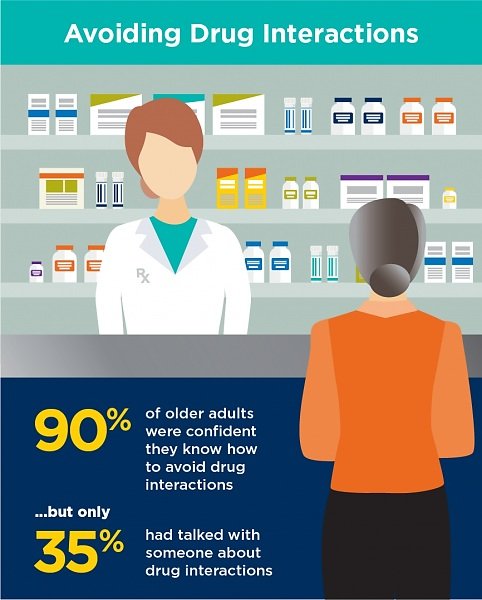Drug Interactions
Dr. Bruno’s Original Post: This study describes what we've discussed about doctors and patients: NOT talking about drug sensitivity, side effects and INTERACTIONS:
". . . only about ONE in THREE older Americans who take at least one prescription drug have talked to anyone about possible drug interactions in the past two years."
Please MAKE SURE that you doctor considers sensitivity, side effects and interactions BEFORE you take a new medication.
Lack of Communication Puts Older Adults at Risk of Clashes Between Their Medicines.
Image Source: University of Michigan
“Many haven’t talked to their doctors, pharmacists or nurses about drug interactions.
Most older Americans take multiple medicines every day. But a new poll suggests they don’t get – or seek – enough help to make sure those medicines actually mix safely.”
“That lack of communication could be putting older adults at risk of health problems from interactions between their drugs, and between their prescription drugs and other substances such as over-the-counter medicines, supplements, food and alcohol.”
“The new results, from the National Poll on Healthy Aging, show that only about one in three older Americans who take at least one prescription drug have talked to anyone about possible drug interactions in the past two years. Even among those taking six or more different medicines, only 44 percent had talked to someone about possible drug interactions.”
“Part of the reason for lack of communication about drug interactions may lie in how older Americans get their health care and their medicines. One in five poll respondents said they have used more than one pharmacy in the past two years, including both retail and mail-order pharmacies. Three in five see multiple doctors for their care.”
“ . . . it is up to patients, pharmacists and doctors alike to reduce drug interaction risks. Patients should write down the names and dosages of their prescription medicines, and of any supplements and over-the-counter drugs they take, and bring it all to their doctors’ appointments or pharmacies, she says. It is also important to be truthful about alcohol consumption when asked, since alcohol use can affect many medications. And patients shouldn’t just stop taking a medicine if they think they’re experiencing a side effect – they should also call their doctor’s office or speak with a pharmacist first.”
“Meanwhile, health care providers should ask patients more about what medicines and supplements they take, and counsel patients at risk of side effects using language they can understand.”

